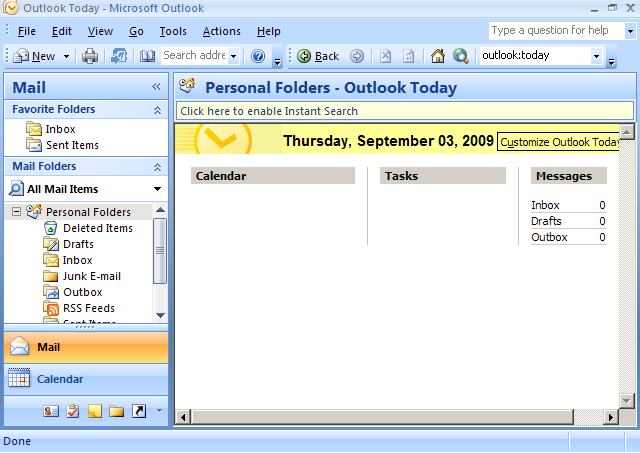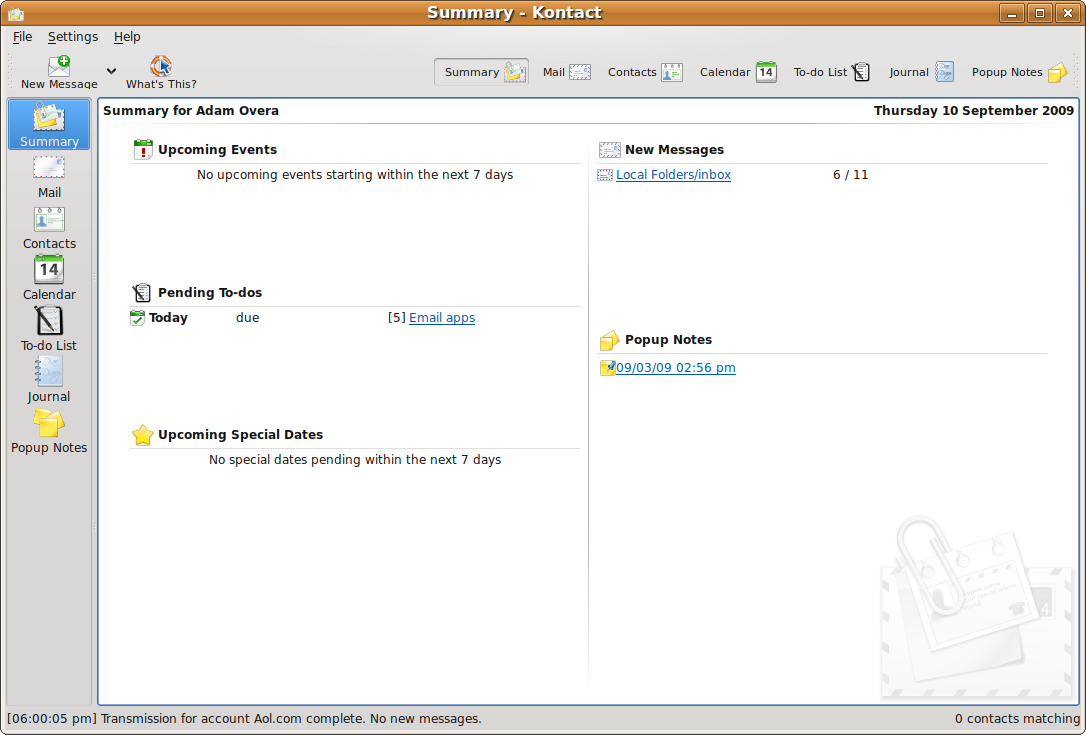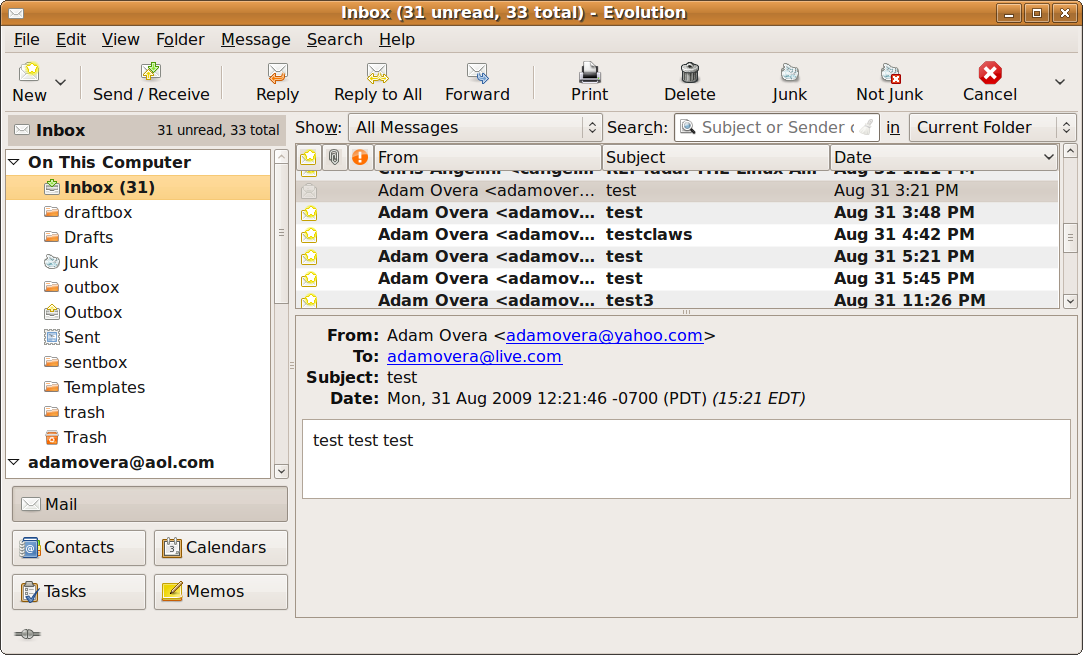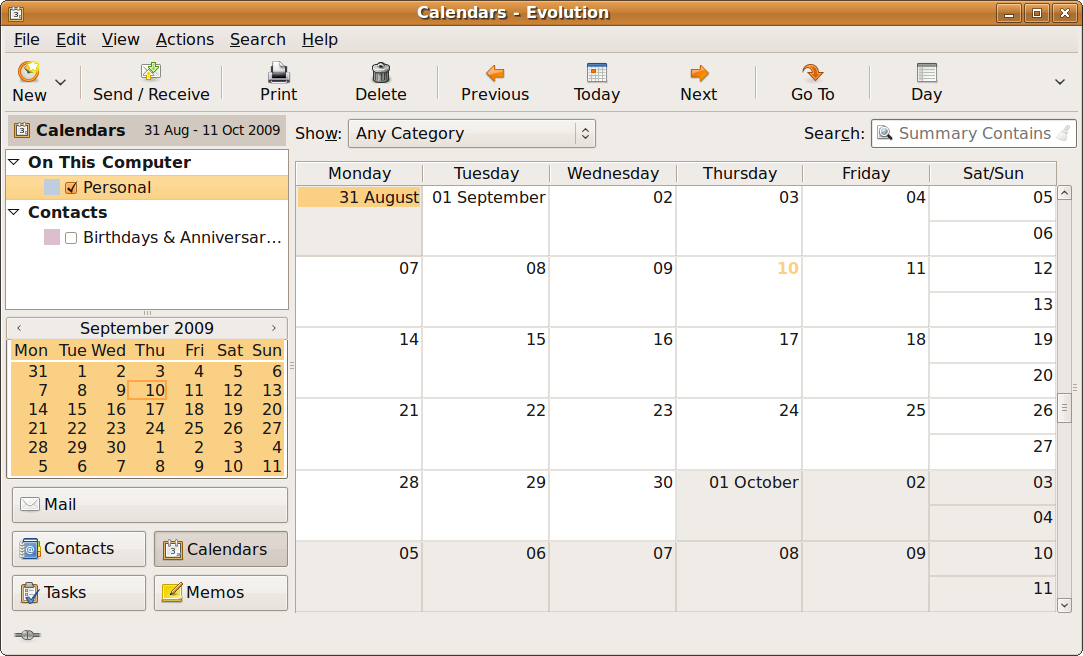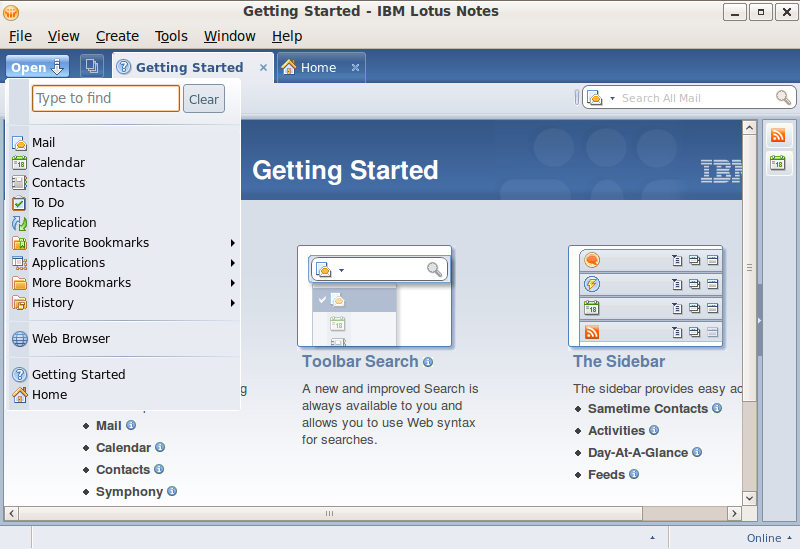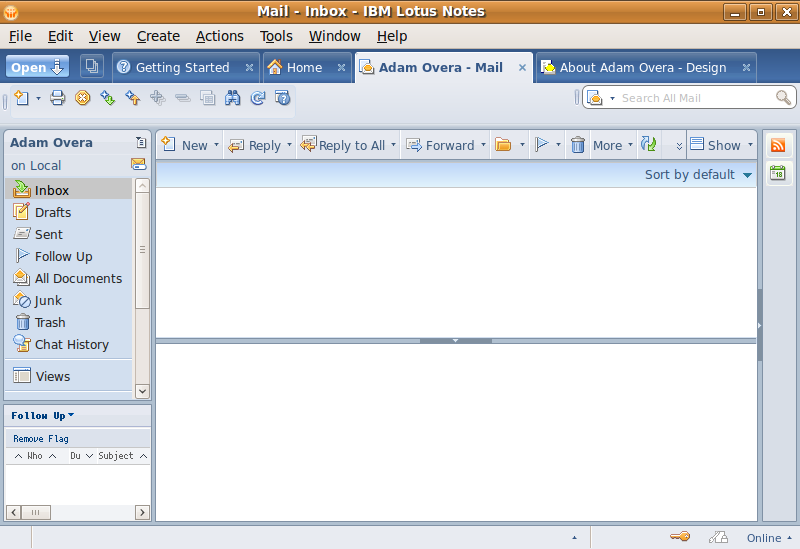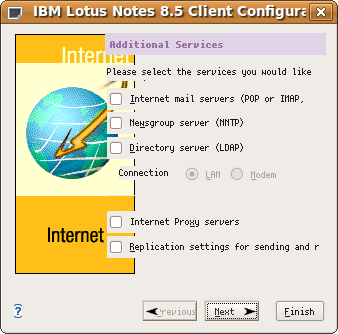Tom's Definitive Linux Software Roundup: Communications Apps
Personal Information Managers
Personal Information Managers (PIMs) are typically thought of as email clients deluxe, but they usually also include at least an address book, calendar, task manager, and some sort of system for taking notes. In the past, all of these features would be handled by separate applications.
Enter the PIM, a multi-function app that organizes your tasks, time, collaboration, and contacts. Microsoft Outlook, being the industry-leading PIM, sets the standard on what this acronym is all about. The apps listed here would be replacements for the full retail version of Outlook, which is a part of Microsoft Office, and not Outlook Express, which was included in Windows 98 through XP (Windows Mail in Vista).
Since email is the bread and butter of PIM software, I tested the email function using four separate accounts. First is my @bestofmedia account from Tom's, which utilizes SSL. Next, I needed a POP Web mail account. Though Yahoo mail is arguably the most popular address today, unfortunately, only the premium version is accessible through an email client without the use of extra plugins or hacks. Therefore, I used my Gmail and Windows Live Mail (Hotmail) accounts in it's place. IMAP-based AOL mail rounds out the test accounts. Simply entering random data into the other functions, such as calendar and notes, was enough to satisfy me that they work. Since some of the features (beyond email) vary from app to app, I'll only mention these tests when one doesn't work the way it should.
Kontact (v. 1.4.2)
Kontact is a little unique, even for a PIM, which often vary heavily from one app to the next. Kontact is not a single application like Outlook or Evolution, but a kind of central hub that seamlessly integrates several of KDE's standalone apps. The email function is taken care of by KMail. KOrganizer handles the calendar and your schedules. Akregator is the RSS reader, while KNode fulfills that function for Usenet. Ktimetracker can display what you spend your time on. KJots is a mechanism for putting ideas to paper. KNotes handles Post-It style sticky notes, and you can guess what KAddressBook does. You could use all of these applications separately, but Kontact puts all of their functions at your disposal in the form of a single-interface PIM application.
What I really like about Kontact, beyond it's sheer comprehensive nature, is the summary screen. By default, Kontact opens to a summary screen that will display upcoming events, pending to-dos, upcoming special dates, new messages, and popup notes. A toolbar on the left side of the screen has navigation buttons to the different functions. This toolbar is the only difference you'll notice between Kontact and it's component applications. The summary screen, toolbars and keyboard shortcuts are all completely customizable.
Every app within Kontact is top quality and can stand on its own. By combining them seamlessly, Kontact succeeds at becoming the most robust PIM to date.
Get Tom's Hardware's best news and in-depth reviews, straight to your inbox.
Evolution (v. 2.26.1)
Evolution is the default email client for GNOME and many distributions that utilize that GUI, including Ubuntu. But Evolution is much more than an email client; it is a full-fledged PIM. A box in the lower left corner of the interface holds buttons to switch between mail, contacts, calendar, task, and memo functions.
Evolution was able to use my @bestofmedia account without any trouble, despite a lack of configurable port settings. Though there is no wizard/template for setting up Gmail or any other Web mail account, none of the test accounts gave me any trouble. You can sort emails by urgency, as well as convert them to tasks or compose memos about them. Searches can also be saved to reference at a later date. By default, there are 22 different categories to assign to contacts, tasks, memos, and calendar entries.
Evolution is incredibly user-friendly as far as PIMs go, without sacrificing advanced functions. I always wondered why many distros choose Evolution over Thunderbird, but I wonder no more. In short, Evolution gives even Outlook a run for it's money. If you don't like to run KDE apps, or if Kontact is simply overkill for your needs, go with Evolution.
Lotus Notes (v. 8.5 trial edition)
Lotus Notes has been around since OS/2 was a contender. It has gone through major cosmetic and foundational changes through the years and version 8.5 is a very different beast than what you may have used in the past. The current interface employs the blue and gray tabbed design of all modern IBM applications.
The email portion of Notes handled all test email accounts perfectly, as did the built-in RSS reader for text feeds. The calendar, contacts, and to-do list portions of Notes are pretty standard. One nice departure is the “Day-at-a-Glance” sidebar that will display info for a single day (defaults to current day) no matter what function or tab you're using. The RSS feeds also share that sidebar, so headlines shouldn't pass you by either. A built-in Web browser allows you to follow links and create bookmarks within Notes simply by opening a new tab. The most unique aspect of Lotus Notes is, and (arguably) always has been, the workspaces. Much like multiple desktops in your OS, Notes allows you to use six different workspaces with which you can assign different tasks. For example, you can have the email function open in every workspace, but devote a different account to each. The same goes with every other function in Notes.
On the downside, there are some issues with text appearing pixellated or simply not fitting in the appropriate widgets. Moreover, this app is painfully slow at initial startup.
Because it is made for corporate deployments (and you have to call for a price quote), Lotus Notes isn't really in this roundup for those who need to replace Outlook or simply want to start using a PIM. Lotus Notes is here for those individuals and businesses who are already tied to it. Simply put, Lotus Notes is no longer a barrier to migration.
Current page: Personal Information Managers
Prev Page Standards, Methodology, And The Legend Next Page Email Clients-
mitch074 I'd like to add something to the article...Reply
- Skype for Linux is currently in version 2.1 (beta) which differs from 2.0 (final) only in the fact that it is now able to deal with ALSA, OSS and PulseAudio transparently - and it doesn't wreck webcam outputs as much.
- Skype for Linux has supported video ever since version 2.0 (beta); it does work quite well if your webcam sends uncompressed video to the system (if your webcam streams MJPEG and you have a 2.6.28+ kernel, you will need some hacker-fu; details on demand)
- a quite well known single protocol IM is aMSN, which is also multiplatform; its other main advantage is that it supports voice and video chats. However, it's not always very stable and requires manual setting up of a TCP port for video and voice to work properly. -
How about benchmarking the applications. Which ones use more ram vs. functionality? How about responsiveness and stability? Those are questions I would like to see laid out because much of the Linux user base have older hardware and don't like things eating away their CPUs and ram.Reply
-
oralward You should really cover something with kde desktop as only because of protest by gnome users is it still the default desktop in any of the three versions you are covering. Its also easier for someone coming from windows. There is a version of ubuntu called Kubuntu that uses kde. This is the other main desktop.Reply -
Great article.Reply
As far as KDE vs. Gnome, I see no problem with the current format, maybe just do a Ubuntu(Gnome) vs. Kubuntu(KDE) vs. Xubuntu(Xfce) vs. MoonOS/OpenGEU/JAD(Enlightenment) roundup, to show off the different desktops(and the few apps that only work on a particular desktop). Any look good with the right theme and some Compiz/Beryl, but KDE and Enlightenment have an edge right out of the box. -
rrockman It's... "Surprising" that you didn't analyze Mercury, one of the most advanced multi-account IM apps.Reply -
haplo602 ah gui only options ... well have a look at CenterIM when you have time. It's a great little IM tool that runs in the terminal. This way I can get to my client everywhere with just a simple ssh client :-)Reply -
"The one major protocol that Empathy supports and Pidgin doesn't is the increaasingly-popular Jabber."Reply
This is just plain wrong. Pidgin has supported Jabber for a long time. It's called XMPP in the later versions which is the name of the protocol used by jabber clients -
rdawise Again, I praise Mr. Overa's coverage of Linux. I am looking forward to the Games section of Linux since I don't have much experience with native games.Reply -
jppayne2 "My major problem with Thunderbird is that it will continually ask for confirmation to ignore a security certificate every time it checks for new mail, by default, every ten minutes. Most of the other clients in this roundup give you the option to always accept or ignore."Reply
Actually, Thunderbird allows you to permanently accept the certificate, which will do what you want. Just pay attention when the confirmation dialog comes up, and select "Accept this certificate permanently". It's the first option (the default is the second option, which is to accept the certificate for the current session).
